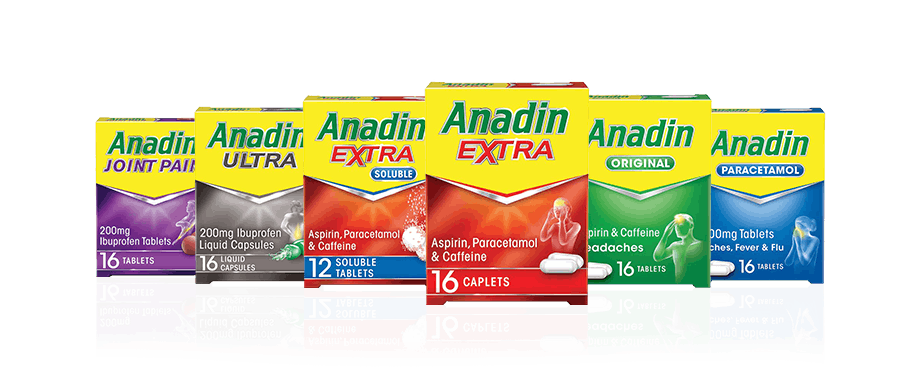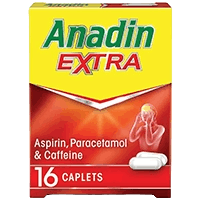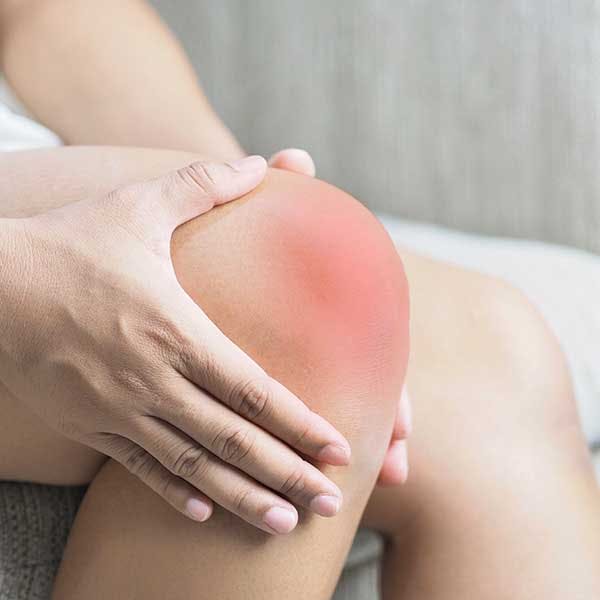Aspirin + Caffeine
Aspirin + Paracetamol + Caffeine
Anadin Extra Tablets Anadin Extra Soluble Tablets
Paracetamol
The different levels of leg pain can vary from annoying to impacting the ability to walk or even bear weight. Read on to find out more about the symptoms, causes, types and treatments available for leg pain.
What are leg pain symptoms?
There are a range of leg pain symptoms you may notice, the most common of which include:
- Cramping
- Stabbing pain
- Aching
- Tingling
- Dull pain
These are just some of the symptoms you may experience. If there is anything causing you to be alarmed, you should see a healthcare professional.
What causes leg pain?
There are several leg pain causes; these include but aren’t limited to:
- Wear and tear – Over time, as we age, our bodies are more susceptible to what is deemed ‘wear and tear’
- Certain health conditions – there are multiple health conditions that may impact your legs, such as problems with blood vessels like deep vein thrombosis or varicose veins
- Joint inflammation – joints attached to the leg such as the knees or, hips can get inflamed or develop knots
- Injury – Injury to the leg whether that’s a sprain, some, bruising or a break will cause pain to the leg If you suspect you have broken your leg, see a healthcare professional as soon as possible.
What are the different types of leg pain?
When it comes to leg pain, there are different types to be aware of, all of which may have different causes. See some examples below:
- Leg cramps – When a muscle in the leg shortens, it causes a sudden cramping pain. While they are usually harmless, they can be painful. They are more common in the calf muscle, below the knee and occasionally in the feet or thighs
- Tendonitis – When tendons swell due to inflammation after a tendon injury, it is called tendonitis. This can cause joint pain, stiffness, and movement in the legs; this can also make walking difficult. It is usually better within 2 to 3 weeks.
- Shin splints – While not serious, shin splints can cause pain and tenderness along the front of your lower leg, also known as your shin. They are usually a result of exercise such as running, particularly if you’re exercising after not being active for a period of time.
- Nerve pain – Occasionally, you may have damage to your sciatic nerve, which runs down each side of your body, through your hips, buttocks, and leg, ending at the knee. The pain can originate in the lower back and travel down the leg.
What treatment is available for leg pain?
Leg pain relief comes in many different forms, some of which you can see below:
Over-the-counter painkillers – Anadin Ultra contains ibuprofen and ease symptoms of pain and inflammation for up to 8 hours of relief*. The medicine is indicated for short term use. See a healthcare professional if symptoms persist or worsen.
*Based on a 400mg dose.
Stretching exercises – You should gently stretch your muscles after a warm bath. For upper leg pain, bend over to reach your toes and for lower leg pain point and stretch your toes from either standing or seated position. If you have continual leg pain or you are concerned that you have broken or sprained your leg or have noticed any swelling, please see a healthcare professional.
Rest and elevate – You should rest your leg and elevate it with pillows. A healthcare professional will be able to advise a suitable mix of rest and usage.
Use ice or heat for pain – Depending on the cause of your leg pain, using ice or heat for relief can be helpful. If the pain is from a new acute injury (less than 6 weeks old), ice may be helpful to reduce inflammation. However, if it is an ongoing issue such as arthritis or muscle stiffness, heat is recommended. Please ensure you speak to a healthcare professional to determine the right course of action.
Frequently Asked Questions
Why is my leg pain worse when I lie down?
If your leg pain is caused by issues with the sciatic nerve, laying down can put pressure on the nerve. To relieve pressure when lying on your back, try using a pillow to keep your legs slightly elevated to help remove the pressure. If you lay on your side, place the pillow between your knees. It is important that if you’re struggling with leg pain, make sure to seek advice from a healthcare professional.
Why does leg pain get worse at night?
There are a number of reasons your leg pain may get worse at night. This could be due to the way a person sleeps, with their feet and toes extending away from the body, shortening the calf muscles and making them more likely to cramp.
To prevent this, you can try a number of different options, such as; drinking fluids to increase muscle function, stretching your legs before bed and try sleeping with a pillow beneath your knees to aid sleep position.
If your leg pain is persistent or keeping you up at night, always seek advice from a healthcare professional.











